Cheetos are a renowned snack loved by kids, teens, and adults alike for their irresistible crunch and cheesy flavor. However, have you ever wondered what’s actually in Cheetos, how many calories they provide, and whether they are healthy for regular snacking? This comprehensive guide explores Cheetos nutrition facts, ingredients, and potential health risks linked to daily consumption. Being informed will help you make better choices for you and your family.
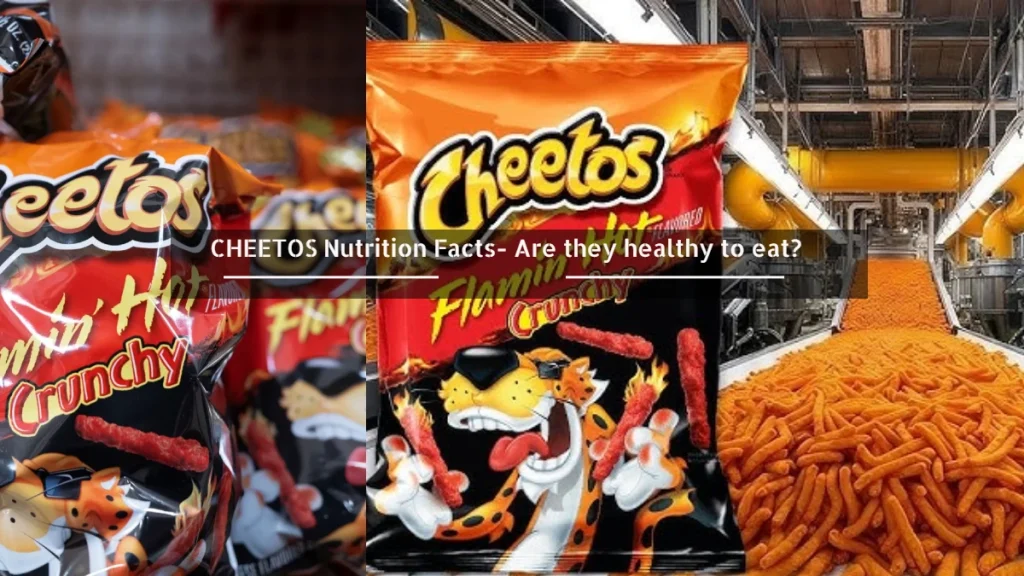
What Are Cheetos?
Cheetos are a popular brand of crunchy snacks made from cornmeal and flavored with cheese, seasonings, and various additives. Available in classic crunchy, puffs, Flamin’ Hot, baked, cheddar jalapeño, and even unique collaborations like the KFC Cheetos Chicken Sandwich, Cheetos offer plenty of variety—but most of them share similar basic nutrition profiles.
Are Cheetos Healthy?
Let’s address the big question: Are Cheetos healthy?
In short, Cheetos are not considered a nutritious snack. While they may satisfy your craving for something salty and crunchy, they’re largely made from refined ingredients and contain high amounts of fat, sodium, and artificial additives.
Key Concerns:
- Low Nutritional Value: Minimal vitamins, minerals, or fiber.
- High in Fat and Sodium: Increases risk of chronic conditions with regular intake.
- Highly Processed: Contain artificial flavors, colors, and preservatives.
Main Ingredients to Watch:
- Sodium: Excess can raise blood pressure.
- Fat and Saturated Fat: High amounts contribute to poor heart health.
- Artificial Additives: Like Yellow 6, linked to behavioral issues in children.
- Vegetable Oil & Partially Hydrogenated Oils: Can contain unhealthy trans fats.
- Maltodextrin and Flavor Enhancers: Used in processed foods and snacks.
Health Risks of Regular Cheetos Consumption
Short-Term Effects
- Bloating or Stomach Upset: High sodium and artificial additives may cause bloating or nausea, especially when eaten in quantity.
- Hyperactivity in Children: Artificial colors (e.g., Yellow 6) have been associated with behavioral effects.
Long-Term Effects
- Weight Gain and Obesity: High calorie and fat content can boost risk when consumed frequently.
- Increased Risk of Heart Disease: Due to high saturated fat, sodium, and highly processed oils.
- High Blood Pressure: Large sodium content can negatively impact cardiovascular health.
- Potential Cancer Risk: Some artificial additives have controversial links to cancer over prolonged exposure.
Cheetos Nutrition Facts by Variety (per 28g serving/1 oz)
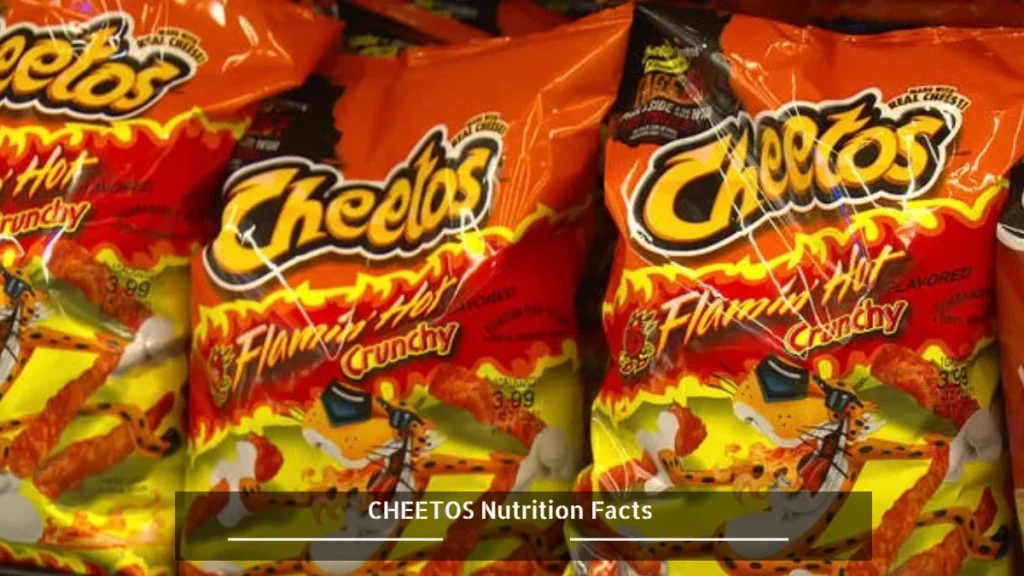
The specific nutrition varies by flavor and style. Here’s a handy breakdown:
1. Crunchy Cheese Cheetos
- Calories: 160
- Total Fat: 10g (Saturated: 1.5g, 8% DV)
- Cholesterol: 0mg
- Sodium: 250mg (11% DV)
- Carbohydrate: 15g (6% DV)
- Dietary Fiber: <1g (3% DV)
- Sugar: <1g
- Protein: 2g
- Calcium: 10mg
- Iron: 0.4mg (2% DV)
- Potassium: 50mg
2. Flamin’ Hot Cheetos
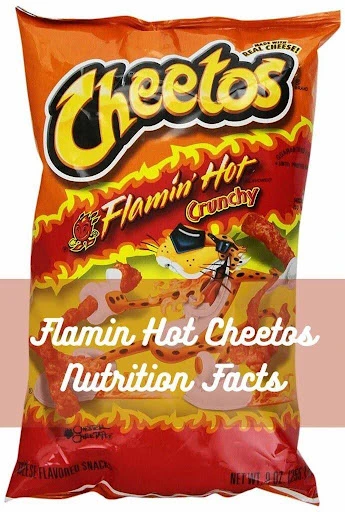
- Calories: 170
- Total Fat: 11g (Saturated: 1.5g)
- Sodium: 250mg
- Carbohydrate: 15g
- Dietary Fiber: <1g
- Protein: 1g
3. Cheetos Puffs
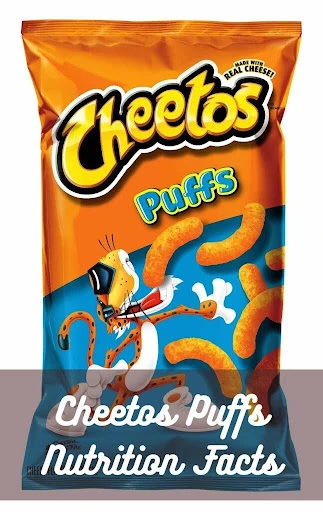
- Calories: 160
- Total Fat: 10g (Saturated: 1.5g)
- Sodium: 270mg (12% DV)
- Carbohydrate: 16g
- Fiber: <1g
- Protein: 2g
4. Baked Cheetos
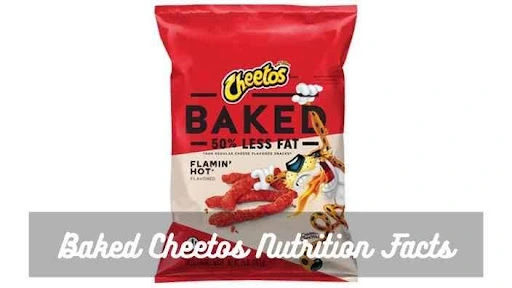
- Calories: 140
- Total Fat: 5g (Saturated: 1g, 4% DV)
- Sodium: 240mg (10% DV)
- Carbohydrate: 20g (7% DV)
- Fiber: <1g
- Protein: 2g
5. Cheddar Jalapeño Cheetos
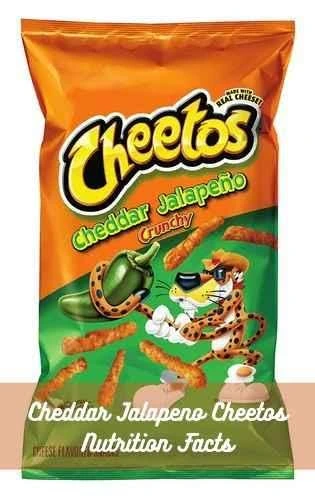
- Calories: 160
- Total Fat: 10g (Saturated: 1.5g)
- Sodium: 290mg (13% DV)
- Carbohydrate: 15g
- Protein: 2g
6. KFC Cheetos Chicken Sandwich (per sandwich)
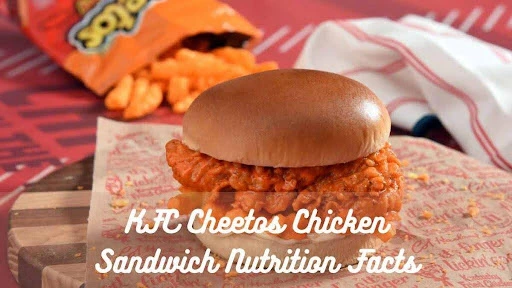
- Calories: 560
- Total Fat: 33g (Saturated: 5g)
- Sodium: 1,180mg (49% DV)
- Carbohydrate: 42g
- Protein: 25g
Comparing Cheetos Flavors: Which is Healthiest?
- Lowest in Calories and Fat: Baked Cheetos
- Highest Sodium: Cheddar Jalapeño and KFC Cheetos Sandwich
- Least Processed: None are whole food snacks, but Baked varieties have slightly less fat and calories.
Pro Tip:
If you crave Cheetos, opt for baked varieties and enjoy them occasionally—not daily.
The Bottom Line: Should You Eat Cheetos Every Day?
While Cheetos can be part of an occasional treat, they should not be a regular staple in your diet. Their lack of real nutrition, combined with high levels of sodium and fat, makes them an unhealthy choice if eaten daily.
Healthier Snack Alternatives
- Air-popped popcorn
- Roasted chickpeas or nuts (unsalted)
- Veggie sticks with hummus
- Whole grain crackers
- Low-fat cheese sticks
Frequently Asked Questions about Cheetos Nutrition Facts
Cheetos contain cornmeal, vegetable oils, whey, artificial flavors, colors, and preservatives. Standard nutrition per 28g: 150-170 calories, 10-11g fat, 13-16g carbs, 2g protein, 240-290mg sodium.
Most Cheetos varieties contain about 240-290mg sodium per serving (28g).
No. Due to high calories, fat, and sodium with little fiber or protein, they are not a good weight loss snack.
Baked Cheetos have fewer calories and fat compared to standard or Flamin’ Hot varieties.
Conclusion
Cheetos are a tasty but highly processed snack food. Regular consumption may increase your risk for obesity, high blood pressure, and other chronic diseases. Always check Cheetos’ nutrition facts on the label before indulging, and try to reach for healthier options when possible.
By being mindful about your snack choices, you can protect your health and enjoy your favorite treats in moderation.
